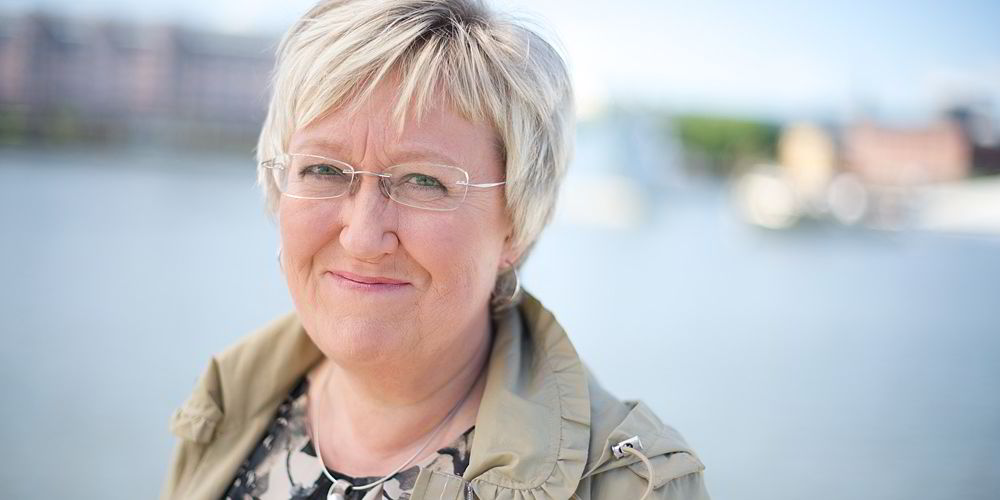
She was elected to the Norwegian Parliament from Troms in 2005. Aspaker previously served as a deputy representative to the Norwegian parliament and was the deputy leader of the Norwegian Young Conservatives.
She was political advisor to the ministry of justice and the police as well as to the ministry of education and research before being promoted to state secretary to the ministry of health and care services in 2004.
Before entering politics, she worked as a teacher.
IntraFish: According to a recent FAO report, only one out of 100 seafood executives globally is a woman. How does Norway compare to the rest of the world?
Elisabeth Aspaker: Overall, 16 percent of executives in limited companies in Norway are women. Within the fisheries and aquaculture sector this share is reduced to 5 percent for seafood executives. However, 5 percent is still a larger share than 1 percent, which is the global average.
IF: What are the main obstacles facing female seafood executives in Norway, which men might not encounter?
EA: Women's possibility to seek leading positions seems to relate closely to the responsibility for family life. Women who take on an executive position emphasize the importance of support from their family, and that conditions at home are well organized.
Experience shows that companies that encourage and arrange for both women and men to take the same portion of parental leave can also refer to good results when it comes to the share of female executives. These factors are important when it comes to increasing the share of women in executive positions.
IF: What can, and should, be done at a governmental level to improve the situation for female executives in Norway?
EA: Norwegian law requires that both men and women are represented by 40 percent in boards of privately owned public limited companies (ASA) in Norway. This has been a requirement since 2006, and has turned out to be an efficient method to increase the share of women in boards.
However, these regulations do not apply to privately owned limited companies (AS), where there are few women at the executive level. The governments wish to shed light on the reasons why there are more female leaders in the public sector than in the private sector.
We have an increasing proportion of women on boards, as middle managers and in management teams. We also have several female senior managers in other fields, such as politics and in academia. But we need more women to take on executive positions, and later this year the minister of equality [Solveig Horne] will present a white paper on equal rights. The paper will raise the challenges of equalities in major fields, like how the authorities can contribute to increase the number of female executives.
We also want to increase the amount of female executives through various means. The minister of trade [Monica Maeland] has made it clear that she wants to see more female executives in boards and executive roles.
IF: How can the industry recruit more women into the Norwegian fish and seafood sector?
EA: A successful seafood industry needs both men and women, on all levels of the industry. Generally speaking, the responsibility for recruitment lies with the industry itself. But I would encourage them to have apprenticeships, nourish a close connection with academic environments, and to show the breadth of opportunities that exists in the seafood industry.
The ministry of trade, industry and fisheries supports recruitment through various means, we have given apprentices their own fishing quotas, increased fishing quotas for schools teaching marine subjects, we have recruitment quotas and every summer we have an arrangement where youths can work with fishing for the summer. By funding specific projects, the ministry has also contributed to pinpoint the numerous career opportunities in the seafood industry and their relevance to different educational directions.
IF: Would you encourage women to seek a career in seafood?
EA: I absolutely encourage women to seek a career in the seafood industry! We need more female role models also because this industry provides a wide range of exciting career opportunities. The seafood industry is looking for people with a broad set of competencies and academic backgrounds. Whether you want to work within biology, engineering, economy, or even marketing, there is a myriad of opportunities in the seafood industry.
Norwegian seafood is served on 37 million dinner plates across the world every day. The seafood industry will be a significant contributor to the world's growing need for healthy, sustainable food. This is an industry for the future!
IF: If you could change one thing about the industry to make it a better place for women, what would it be?
EA: We need more women in top positions, also in the seafood industry. Women who embrace challenging tasks. Women who want to make changes and find better solutions. I am sure that more women in leading positions in the industry will make it a better place for female workers.
IF: Have you faced any obstacles in your political career because you are a woman?
EA: No, in fact I cannot remember any obstacles because of my gender. In my experience, there is a tough competition for political positions on both local, regional and national level. This tells me that we have a healthy democracy in Norway, and I have to admit that I have not always been a winner in earlier nominations.
IF: What is the dumbest advice a man has ever given you on a professional level?
EA: I try not to focus on negative advice or obstacles, but rather I keep looking forward, as I believe that is the best way to get ahead. Instead of sharing the worst advice I have been given, I want to offer young and upcoming women good ones: be curious, and always seek new knowledge. Because the best leaders are those who are lifelong learners.

